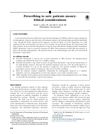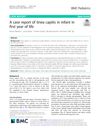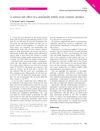 December 2016 in “The Journal of Sexual Medicine”
December 2016 in “The Journal of Sexual Medicine” Finasteride for hair loss may cause erectile dysfunction due to tissue fibrosis, and various factors contribute to female sexual dysfunction.
 November 2001 in “CRC Press eBooks”
November 2001 in “CRC Press eBooks” Hair loss from telogen effluvium happens when a disturbance or imbalance causes hair to fall out prematurely.

Individualized treatment plans, including lifestyle changes and specific medications, are crucial for managing PCOS in adolescents.
 2 citations,
March 2018 in “Journal of The American Academy of Dermatology”
2 citations,
March 2018 in “Journal of The American Academy of Dermatology” Doctors should prescribe cheaper, off-label medication and teach patients how to use it to save money ethically.
 44 citations,
June 1985 in “Fertility and sterility”
44 citations,
June 1985 in “Fertility and sterility” Combination drug therapy is effective for hirsutism that doesn't improve with just one medication.
 July 2018 in “Elsevier eBooks”
July 2018 in “Elsevier eBooks” Lichen Planopilaris is a hair loss condition best treated early with various medications, including hydroxychloroquine, to prevent permanent baldness.
 September 2022 in “International journal of infectious diseases”
September 2022 in “International journal of infectious diseases” A woman with a rare scalp infection was cured after one month of medication.
 September 2023 in “Journal of the American Academy of Dermatology”
September 2023 in “Journal of the American Academy of Dermatology” GoodRx.com helps find the cheapest options for finasteride, a medication not often covered by insurance.
 3 citations,
August 2017 in “Oral and Maxillofacial Surgery Cases”
3 citations,
August 2017 in “Oral and Maxillofacial Surgery Cases” Using platelet-rich plasma and fat grafting to treat nerve pain showed promising results with no side effects.
 6 citations,
February 2023 in “Advances in Therapy”
6 citations,
February 2023 in “Advances in Therapy” Baricitinib, a drug for rheumatoid arthritis, atopic dermatitis, and alopecia areata, is generally safe with low risk of major side effects, even in patients with risk factors. It's also effective in promoting hair regrowth in alopecia areata patients.
 1 citations,
January 2023 in “Przegląd Dermatologiczny”
1 citations,
January 2023 in “Przegląd Dermatologiczny” A man's severe skin reaction from cancer treatment improved with early diagnosis and proper medication.
 14 citations,
October 2006 in “Journal of The American Academy of Dermatology”
14 citations,
October 2006 in “Journal of The American Academy of Dermatology” A woman with Parkinson's disease experienced hair loss from the Parkinson's medication pramipexole, which improved after stopping the drug.
 135 citations,
April 2017 in “Advances in Clinical and Experimental Medicine”
135 citations,
April 2017 in “Advances in Clinical and Experimental Medicine” New treatments for PCOS show promise, including both medication and non-medication options.
A medicine company has recalled a drug because it contained an unlisted blood pressure medication.
12 citations,
August 2016 in “Mycopathologia” A man's pubic hair infection was treated by shaving and using antifungal medications.

Seborrheic dermatitis and dandruff are often treated with antifungal and anti-inflammatory medications, which can reduce symptoms and yeast growth on the scalp.
 January 2022 in “Eduvest”
January 2022 in “Eduvest” A teenage girl with a fungal scalp infection got better with antifungal and allergy medication, plus medicated shampoo.
 May 2012 in “Reactions Weekly”
May 2012 in “Reactions Weekly” A man developed hair loss from testosterone treatment but improved with additional medication.
 10 citations,
February 2019 in “BMC pediatrics”
10 citations,
February 2019 in “BMC pediatrics” An infant with scalp fungus was cured after extended treatment with antifungal medication.
 38 citations,
July 2010 in “Clinical, cosmetic and investigational dermatology”
38 citations,
July 2010 in “Clinical, cosmetic and investigational dermatology” To treat tinea capitis in children, oral antifungal medication is necessary, with newer drugs offering shorter treatment times than the traditional griseofulvin.
 July 2002 in “Australasian Journal of Dermatology”
July 2002 in “Australasian Journal of Dermatology” A woman with lupus had hair loss and skin issues that were successfully treated with medications.
January 2022 in “Clinical Cases in Dermatology” A 7-year-old girl's scalp infection was cured with oral medication and medicated shampoo.
 August 2023 in “Journal of inflammation research”
August 2023 in “Journal of inflammation research” An elderly Chinese man lost all his hair after taking a new heart medication.
8 citations,
October 2021 in “The international journal of risk and safety in medicine” The document sets criteria for diagnosing long-term sexual dysfunctions caused by certain medications.
 12 citations,
May 1989 in “Postgraduate Medicine”
12 citations,
May 1989 in “Postgraduate Medicine” The document concludes that hair loss is common and can be treated with medications like minoxidil or surgical options, and it significantly affects people's psychological well-being.
 41 citations,
August 1988 in “Journal of The American Academy of Dermatology”
41 citations,
August 1988 in “Journal of The American Academy of Dermatology” A woman with subacute cutaneous lupus erythematosus had widespread skin symptoms triggered by medication and sunlight, which improved with specific treatments.
December 2003 in “The journal of investigative dermatology/Journal of investigative dermatology” Glycerol may improve wound healing and prevent keloids, a device can measure itch intensity, male pattern baldness is highly heritable, and fumaric acid esters may work for psoriasis by causing cell death in T cells.
 3 citations,
November 2005 in “Women's health”
3 citations,
November 2005 in “Women's health” Excessive body hair in women can be caused by various conditions and treated with medication like Diane® 35 or androgen blockers.
 3 citations,
January 2015 in “Clinical and Experimental Dermatology”
3 citations,
January 2015 in “Clinical and Experimental Dermatology” A man developed a serious muscle breakdown condition after using a hair loss medication not known to cause this side effect.
November 2014 in “PharmaTutor” Finasteride may help postmenopausal women with hair loss but is not effective for all and should be used cautiously in premenopausal women.























